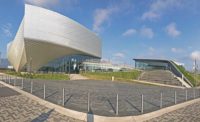Notice-to-Proceed Launches Ambitious Red Sea Crossing

|
 To clear surface and submarine vessels, proposed bridge would have the longest suspension span in the world, at 4,987 meters, or 3.1 miles.
|
Acting on endorsements and pledges of land from the president of Yemen and the president of the African nation of Djibouti, a Dubai-based developer has tapped an American firm to build a bridge across the Red Sea.
Middle East Development LLC on April 25 issued a notice-to-proceed to Noor City Development Corp., Napa, Calif. It authorizes Noor City, as sole agent, "to proceed with the planning, development, construction and management of the bridge between Yemen and Djibouti."
MED is chaired by Tarek M. Bin Laden. His second-generation company, a powerhouse of construction in the Middle East, labors under the dark reputation of Bin Laden's notorious half-brother, Osama Bin Laden. While Osama's name is an anathema to much of the world, the greater Bin Laden family has a long history of driving major construction and development in the region. Its work continues today with signature projects throughout the region. Tarek Bin Laden turns aside questions about his half brother, saying he has no contact with him and no knowledge of his whereabouts.
The newly formed Noor City Development Corp. is led by Tariq E. Ayyad, president. Ayyad is also president of ShareChive LLC, San Francisco, a technology firm with patented systems for delivering constantly refreshed project data to mobile computers on jobsites, with an emphasis on highway and large infrastructure. Ayyad is an American of Kuwaiti extraction, a civil engineer, construction manager and a former bridge engineer with the California Dept. of Transportation.
| + click to enlarge |
 |
Ayyad says MED's goal is to create economic opportunity and stability on both sides of the Red Sea by tying in the bridge to new rail and road construction hubs and networks in Africa and the Arabian Peninsula.
"MED is a developer. They want to create jobs, they want to move products," Ayyad says. "It is very, very critical to connect the African nations and their products and crops right to the Middle East. The Middle East is extremely wealthy in money and oil, but we lack quite a lot of crops and services."
Noor City is forming an international commission to refine concepts for a design/build/operate/transfer concession to create the rail and highway crossing. Concepts developed by Danish engineering firm COWI envision a 28.5 km crossing with a suspension span over the Bab al Mendab Straits.
Phase I will likely be a 3.5 km leap to the Yemeni island of Perim and a 4 km land link to the western channel. Phase II may be broken into several contracts for the 21.5 km transit to Djibouti, which will include 13 km of suspension bridge and 8 km of girder bridge. Cost is estimated at between $10 billion and $20 billion, depending on design, project organization and financing. Construction would take seven to nine years.
"If you open up to this [transportation system that provides access into the heart of Africa] then you can create jobs by moving products, moving services," Ayyad says. "You can ignite economic development just by the transportation element. The bridge is really critical."


